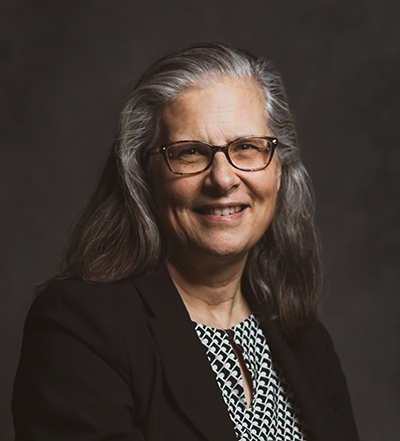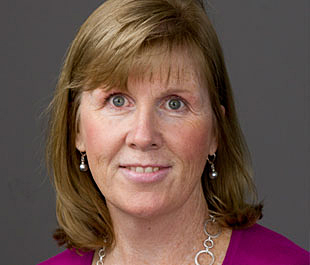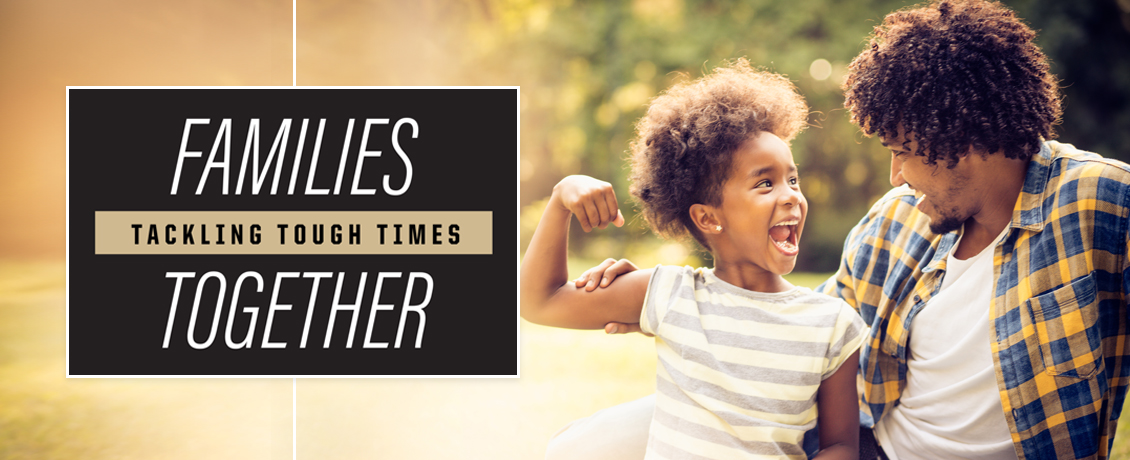Building a Community of Support
Online initiative encourages families adjusting to life amid the pandemic
Story by Matt Schnepf
When the COVID-19 pandemic began to dramatically impact local communities in March, the College of Health and Human Sciences responded with the launch of “Families Tackling Tough Time Together,” a 10-week program aimed at helping families strengthen their resilience while they cope with the crisis.
 Shelley MacDermid Wadsworth, HHS Professor of Human Development and Family Studies
Shelley MacDermid Wadsworth, HHS Professor of Human Development and Family Studies
“Every family has strengths but at times like this, people can benefit from being encouraged and reminded of that,” says Shelley MacDermid Wadsworth, a professor of human development and family studies. MacDermid Wadsworth serves as the project’s coordinator and also directs the Military Family Research Institute and the Center for Families.
“We invite both civilian and military families to participate together, since they are experiencing many similar challenges during the COVID-19 pandemic,” she says. “It’s a terrific opportunity for them to build their resilience skills, because now we have a situation where they’re quarantined at home, spending a lot of time together. Children also want to be reassured by their parents because they’re anxious.
Through this interactive forum, families and individuals have access to helpful information and engaging activities posted through a public Facebook group. They also can share personal experiences and encouraging messages. The Families Tackling Tough Times Together website provides resources for all age groups — from children and youth up through older adults.
As Americans began to quarantine in March because of the coronavirus, MacDermid Wadsworth knew people’s stress levels likely would increase. For example, many parents must adapt to working remotely while balancing childcare and e-learning.
A working group of 70 people contributed time and expertise to quickly create and bring the program online. Team members include Purdue faculty, staff and students; representatives from Purdue Extension-Health and Human Sciences; and colleagues from across the University and nation. External partners, including representatives from additional schools and institutes, have either contributed or adapted materials for the project.
The free resource went live April 16 via a dedicated Facebook group with new kits of downloadable materials unveiled each Sunday during the first 10 weeks. Topics addressed have included the following:
- Believing, sharing, acting
- Our family can do this
- Our family is creative
- We care about each other
- Our family will get through this
- We share our feelings constructively
- Our family is adaptable
- We can get stronger
- We tell each other the truth
- We take action
Facebook visitors also enjoy helpful articles, videos, story hours and live events. By late summer, the Facebook group had grown to 1,400 members from 25 countries.
 Linda Curley, HHS Extension Educator in Lake County
Linda Curley, HHS Extension Educator in Lake County
Linda Curley, a Health and Human Sciences extension educator in Lake County, Indiana, serves on the project’s working group. Through her involvement, Curley has seen firsthand how the program benefits her community, whether within people’s immediate homes or their extended families.
“We realized there were families struggling with stay-at-home orders. Many also had distant family members they couldn’t see or assist because we were asked to shelter in place,” Curley says. “We also noticed the struggles of families who have co-parents, where children typically go back and forth between two different homes but now may be staying with just one parent during this time.”
Curley’s team focused on creating resources that address the unique needs of older adults. “We looked for concrete, research-based information to share about what was currently happening in communities, positive information we could share in reference to the different weekly topics,” she says.
Participation in the group grew quickly. “All of a sudden, we have people all over the world interested in the information being posted,” Curley says. “We felt the quick, 10-week turnaround on the kits was quite phenomenal to see how social media works to benefit those seeking assistance or resources during these unprecedented times.”
MacDermid Wadsworth believes it’s important for land-grand universities like Purdue to lead these high-impact efforts supporting local families. “Beyond the normal research we do and all of the special projects people have launched, in particular we should be trying to help families, assisting them as they deal with the pandemic,” she says. “This project also has had a positive effect on the those involved in the program. They feel like they are doing something good by taking action in response to the situation, instead of just being challenged by it.”
Now, as families continue to deal with the COVID-19 pandemic, the program will continue into fall to help families cope with the crisis. “We definitely want to release some of the same ideas shared in our first phase but also look to make this program better, stronger and more active,” MacDermid Wadsworth says. “We might expand into additional platforms as well.”
More Life 360 Stories
Milestones
Alumni
- Model Behavior
- On the Frontline of COVID-19
- Alumni making giant leaps in health care, aviation industries
- Tradition Transformed
- Emerging Leaders
Research
- Wearable and affordable, device targets swallowing disorders
- Evolution of a Research Relationship: From PhD Student to Peer
- Rapid Response Grant Recipients
Faculty
- Wearable and affordable, device targets swallowing disorders
- Beware the ‘quarantini’
- Safe and sustainable tourism in times of COVID-19
- Building a Community of Support
- Adapting Online … in a Hurry
- Thinking Beyond the Pandemic
- Rapid Response Grant Recipients
- Risk & Resilience: How the Pandemic Affects Those with Special Needs
Students
- Evolution of a Research Relationship: From PhD Student to Peer
- On the Frontline of COVID-19
- Tradition Transformed
- Adapting Online … in a Hurry
- Pandemic Pivot brings Gen Zs and Baby Boomers together in unique way
- HTM students learn and build community
- Emerging Leaders

